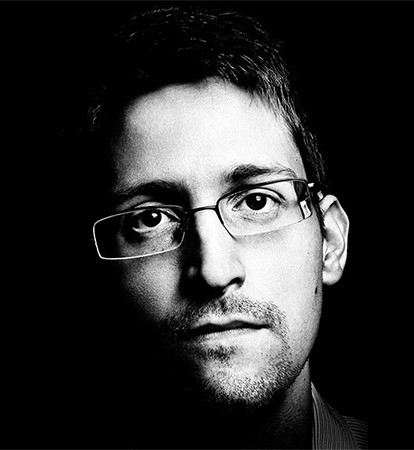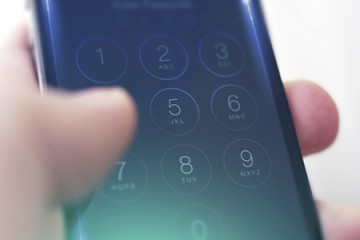Edward Snowden told a capacity crowd at Johns Hopkins on Wednesday night "it doesn't really matter what I think" about the covert surveillance data he exposed in June 2013. But Snowden's thoughts on intelligence gathering, data privacy, and other issues were precisely what everyone came to Shriver Hall to hear.

Image caption: Edward Snowden
"The focus on personalities really misses the point," Snowden said of the attention that has swirled around him over the past two and half years. "It's about us—it's about the world we want to live in."
Exiled in Moscow, Snowden spoke live via video broadcast about both the international and personal ramifications of his role in one of the largest intelligence leaks in U.S. history, and more philosophically about the significance of privacy.
The polarizing whistleblower, both glorified as a human rights activist and vilified as a national traitor, drew a crowd that fanned out across the Wyman Quad well before the venue's doors opened. The student-run Foreign Affairs Symposium arranged Snowden's talk to headline this year's speaker series.
The event took place against the backdrop of a fresh surveillance controversy that Snowden on Twitter called the "most important tech case of the decade": a federal judge's order that Apple assist the FBI in mining iPhone data associated with the December terrorist attack in San Bernardino.
Also see
During his talk, Snowden condemned the FBI's stance, saying the federal agency "has a means of attacking this device on their own," yet has targeted "an arbitrary software company" to participate as a "convenience measure."
"This is a case that's not San Bernardino at all ... it's not about terrorism at all," he said. "It's about precedent."
Though uncertain on his own future, Snowden spoke with a measure of optimism about the progress he has seen since bringing to light the legal—and by some perspectives, moral—failings of several national surveillance programs.
"We have seen the three branches of government deliver reforms in response to these disclosures," he said, citing President Obama's statement that "this debate will make us stronger" as a nation.
He pointed to the USA Freedom Act, enacted in June to impose new limits on intelligence agencies in their collection of telecommunications data.
Moderator Daniel Solove, George Washington University law professor and founder of the TechPrivacy firm, asked Snowden about how the public can trust the morality of a whistleblower.
Snowden described whistleblowing as "a mechanism of last resort" that an individual takes only when compelled so strongly "that they're willing to light a match and burn their entire life to the ground."
Before June 2013, Snowden was living comfortably, he said, making six figures as a contractor for the NSA and "living in an extraordinary house with the woman I love."
He said there was no "cinematic moment" that snapped him into revolt against the ethical violations he saw in NSA's surveillance activities, collecting "private records of private lives." That included the $20-million-a-year PRISM program, which gathered Internet communications from trusted major companies like Google and Apple.
Rather, "it was a gradual progression," he said, as he got wider access to documents through his work and "realized the private realities of what the government was doing [were] distinctly different from the government representation."
He said he had spoken with co-workers who agreed on the wrongness of the surveillance, but they didn't like what his conversations were suggesting. They warned him, "You know what happens to people who say something about this."
Snowden remains in Russia—the only country that has offered him political asylum after his disclosure of top-secret National Security Agency documents to the press—while awaiting the day he can be guaranteed a fair trial in the United States.
"Let's say that's a work in progress," he said of those prospects, noting that all he's received is a letter from the Attorney General "that promised I would not be tortured."
Snowden said he is "quite sympathetic to the government's arguments" against him, and had previously volunteered himself for prison.
He's now backed off on that position, he said, based on the personal advice of "people I respect," including Daniel Ellsberg, who earned fame and notoriety in the 1970s for leaking the Pentagon Papers. He said Ellsberg told him that volunteering for prison was essentially conceding that all that matters is the written law, rather than what's right and wrong.
"I have hope … that I will not die in Russia," Snowden said—a hope he bases on technology.
"I might go to sleep in Moscow, but right now I'm in Baltimore," Snowden said on the video screen. "And that's a very powerful thing."
Posted in Science+Technology, Voices+Opinion, Politics+Society
Tagged cybersecurity, data mining, privacy, edward snowden








